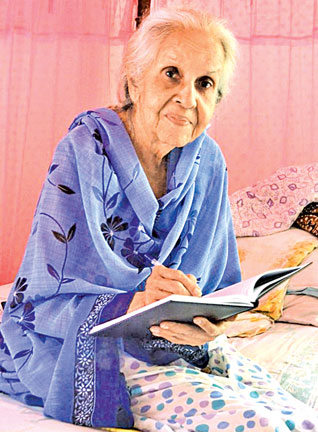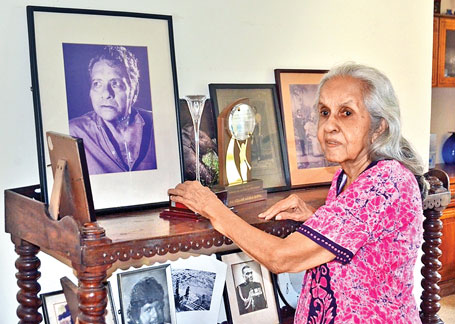|
Spanning generations…
‘I will return
to the stage
some day - Iranganie Serasinghe
by Carol Aloysius
Born in 1927, in a family of two sisters and a brother, and despite being Sri
Lanka’s most famous stage and screen actress one thing is evident whenever she
pauses to recall her childhood:. That she is rooted to her village upbringing
 Actress, wild life conservationist, wife of a celebrated actor, mother and
grandmother, Iranganie Serasinghe, now in her 90th year and virtually retired,
her once active life hampered by two heart attacks, says her greatest wish is to
return to the stage. Given her willpower which she has in plenty, she may do
just that. Actress, wild life conservationist, wife of a celebrated actor, mother and
grandmother, Iranganie Serasinghe, now in her 90th year and virtually retired,
her once active life hampered by two heart attacks, says her greatest wish is to
return to the stage. Given her willpower which she has in plenty, she may do
just that.
Our meeting, though planned ahead was almost stalled if the repeated phone calls
to cancel it had reached us before we set out to her Pita Kotte house. “I have
to undergo an emergency eye operation tomorrow,” she said. But, observing my
disappointment she agreed to talk to us for a few minutes.
Except for the four poster bed with pink curtains on which she sleeps which is
the centre piece of her white washed room, and a single iron bed on a side of
the room, a wardrobe containing her clothes and a small table with books and
newspapers, her room is bare. Lit by Chinese lamps, with windows that open to a
little garden outside, the atmosphere is soothing and serene.
Untouched
For a woman who has had to meet the challenges of a demanding career, be it on
the stage, on radio, in journalism or acting in television and cinematic roles,
Iranganie’s face is remarkably untouched by her punishing lifestyle.
The smooth golden complexion owes its glow, to the absence of layers of powder
and make up and the full lips are naturally red. “I never use powder or lipstick
unless I have to”, she says. Her wavy dark hair is now naturally grey and shiny,
and the large as expressive as ever. To oblige cameraman Vipula Amerasinghe who
requests for a photo shoot, she changes her nightdress to a colourful wrap
around skirt with matching blouse exiting from her room unaided and as
gracefully as a dancer, her slim figure erect and poised, into a sunlit filled
corridor. The barefoot slim figure which glides ahead of us along the sloping
marbled floor stops at the entrance of the dining room and stands in front of a
large picture of a typical village scene. “The life sized frieze drawn in
sensuous colours which contrast strongly with the stark white walls on which it
has been drawn by an artist friend using an acrylic pen, brings to life a
village community engaged in day to day activities - women planting rice,
harvesting the crop, pounding paddy, and men ploughing, sewing paddy seeds and
taking time off to have a betel chew or a smoke of beedi.” When I get homesick
for my village which I often do, looking at this picture which evokes so many
wonderful memories of my youth|, soothes my spirits”, she says with appealing
candour.
Dining room
Her dining room serves many purposes, she tells me. Reading is one, she says
pointing to a number of book cases filled with books - her son’s collections and
those of hers and her late husband Winston Serasinghe. The antique table is for
writing and dining.
Childhood
Born in 1927, in a family of two sisters and a brother, and despite being Sri
Lanka’s most famous stage and screen actress one thing is evident whenever she
pauses to recall her childhood:. That she is rooted to her village upbringing.
No matter the changes life has brought to her life, the girl who spent her
childhood and early teenage years sailing down the Gurugoda oya stealing rides
on paaruwas in the peace and quiet of Moodugamuwa is still a simple village girl
at heart and mind.
Ancestral home
The massive house in which she lived as a child had three meda midulas (open
courtyard). I noticed that Iranganie had tried to re create this peasant
atmosphere in the present house she lives in, which has a small meda midula at
the entrance with a scatter of large rocks and some ferns.
Religious and ethnic harmony
A significant feature in her own household Iranganie recalls, was that they
practiced two religions - Buddhism and Christianity. Boarded in an Anglican
school, Bishop’s College, during the outbreak of the world war, she says,
“Although there was a mix of ethnic groups from Chinese, Japanese, Scottish,
English, Maldivians to Sri Lankans we all got on famously and never thought of
each other as belonging to a particular community,- but people who belonged to
one nation.”
Entertainment - then and now
“We had little entertainment unlike today. No TV, no mobile phones. When we went
for a film our focus was on the characters and acting. There were no mobile
phones to distract us. That is how it should be. Yet, we never missed out on the
simple pleasures of life. So to have relatives coming over was seen as a great
event in our otherwise uneventful life. The highlights of those events were the
Kandyan dancers and Kandyan drums”. Even today she admits, “when I hear the
sound of Kandyan drums I want to leap and dance”...
Ruk Rekaganno
She is happy the Ruk Rekaganno Society has been able to raise more awareness
among the villagers especially in protecting their natural forests.
Drama
Her gifts for mimicry, and love for the opera, she believes, must have sown the
seeds for her passion for drama.
|

With a portrait of Winston Serasinghe |
Her first public performance was at Kandy Girls High School when they performed
Pygmalian and she played Prof. Henry Higgins. “It was also the first time I met
my second husband Winston Serasinghe, then working in the Prisons Department.
After seeing our play he saw me and said, “Ah that girl can act”. I was
flattered.”
Actual professional training in drama however came when she went to London
accompanying her first husband. Hearing the news of her imminent departure, her
erstwhile English lecturer Prof. Ludowyke advised her to join a Theatre school.”
At that time I didn’t know there were institutions called ‘Theatre Schools”, she
confesses with disarming candour. “Until then I believed that one simply got up
and acted.”
Marriage and children
Of her second marriage she says of Winston, ‘Sera was a very happy-go-lucky
person. He was a ruggerite from Royal College and married late in life. We had a
17 year age gap. He was also an actor. It was the first time I heard of a
ruggerite being an actor”, she admits wryly.
More than anything, Iranganie says she yearned to be a mother. ‘I loved babies.
And I wanted to become a mother.’ So when their two sons Ravi and Ranjith were
born she was over the moon...
Unforgettable stage roles
Two memorable roles she recalls were in Antigone and Macbeth.
“Both roles were very complex. Macbeth is still a favourite play. I can read it
once gain and see something different even today”.
Films
The first time Irangani faced a camera was when she played the role of an old
woman who hogged the middle of the road in a docu drama ‘Be Safe or Sorry’ by
Lester James Peries in 1955.
Acting in Rekhawa was a memorable experience, she recalls. She was 29 years old
and not yet a mother, but had to play a much older woman in the film. Although
initially scared of playing the role as she felt she hadn’t mastered the Sinhala
dialogue well, she says, “It was my village background that helped me. I didn’t
imitate those women. I knew their body language and the way they spoke”.
Most frightening moments
“Almost being burned on a funeral pyre in God King. It was Lester James Peries
who save my life or I would have ended up as a charred skeleton!”
If she lived her life again would she still want to act? I ask before we leave.
“ Acting is in my blood and my passion. My secret wish is to return to the stage
even after two heart attacks and my advanced age”.
Mother roles
‘I have come to accept them and some are quite interesting as in Bak Maha Deega
which I enjoyed as it was a comedy”.
Things she misses most?
Bathing in the river and silence. Even in Yala the roads are now overcrowded
with vehicles unlike in the past and animals flee disturbed by the noise they
create, she complains. She also misses walking in paddy fields, and interacting
with village folk.
Dhamma
To our final question, “If you could live your life again what would you wish?
She furrows her eyebrows in deep thought and then replies, “To have studied the
Dhamma much earlier in life, because I would have seen life in a different way.
The Dhamma enables the human mind to achieve inner tranquillity shutting out
everything else that is rooted in, basically greed (thanha ).’
(Pix: Vipula Amerasinghe)
|

